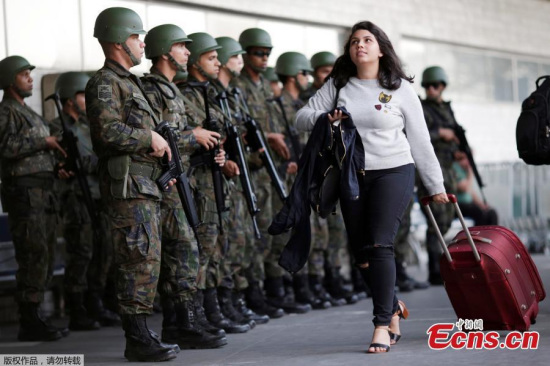
A passenger walks as Brazilian Air force soldiers patrol the Tom Jobim International airport ahead of the 2016 Rio Olympics in Rio de Janeiro, Brazil, July 19, 2016. (Photo/Agencies)
The Brazilian government has in recent days been announcing the measures to reinforce security at the 2016 Olympic Games in Rio de Janeiro on Aug.5-21, especially after the arrest of ten people suspected of plotting terrorist acts.
In a secret operation codenamed Hashtag conducted two weeks before the Rio 2016 Olympic Games begin, 10 people were arrested in a number of states. This was announced by Justice Minister Alexandre Moraes on July 21 at a press conference, who stated that those arrested had been given temporary prison sentences of 30 days.
He said the first phase of Operation Hashtag had arrested 10 individuals believed to be part of a "suspected terrorism cell" in Brazil. Two more suspects were not arrested but are currently being searched for.
According to Moraes, Brazilian intelligence operatives had been monitoring the suspects for several months, and that these suspects had exchanged information about "preparing terrorist acts" through text messages and on social networks, such as WhatsApp and Telegram.
"From the moment that they began speaking of preparations...the government acted swiftly," he said.
"Various messages showed these people celebrating the attacks in Orlando and Nice...and posting and sharing executions carried out by the Islamic State," added the minister.
Certain suspects also released a video on the Internet swearing allegiance to the Islamic State, although there was no indication they had personal contact with members of the terrorist group or travelled outside of Brazil to meet them.
"They repeated recordings, there was no interaction. The person who pledged allegiance was made to believe they were part of the Islamic State," explained Moraes.
Last week, General Sergio Etchegoyen, chief minister of institutional security, said the Nice attack had led the government "to revise all security measures and adopt far more rigid security" for the Games.
"We must make an audit of our entire planning to see if any weaknesses exist that, for any reason, we might have missed," he added.
On Thursday, the government held a press conference where it announced that, in order to control and supervise transport, over 21,000 soldiers from the Brazilian army will patrol highways, train stations, the Rio port and the city's airports.
During the Olympic Games, an elite military unit will also be responsible for security at competition sites, while Rio's military police will focus on public security on the streets.
On July 24, when the Olympic Village opens, restrictions will begin on the airspace around Rio, with the air force having 80 planes and 15,000 personnel to ensure air safety.
At the conference, Defense Minister Raul Jungmann said that no terrorism suspect will be able to enter Brazil without being spotted and monitored.
"Brazil is a peaceful country but it is not a defenseless country. We know how to defend ourselves and counter-attack. If something happens without our knowledge, we will be untiring and implacable in pursuing and punishing those responsible," emphasized the minister.
Jungmann also added that representatives "from intelligence agencies and systems of 106 countries" would also be on the ground to help security efforts.
New security norms also entered into force on July 18, with increased checks at airports, including random searches of passengers and luggage.
Last week, a simulation of a terrorist attack on a train in the Deodoro station united for the first time all the Brazilian forces operating as part of the Olympic security plan.
The exercise, involving around 1,000 police, soldiers, security agents and extras, simulated the explosion of a "dirty bomb" by two terrorists in a train compartment.
The exercise had been planned by around 20 institutions for six months, to simulate conditions as real as those that might occur.
Such simulations will continue in the coming days, until the first athletes arrive on July 24.


















































